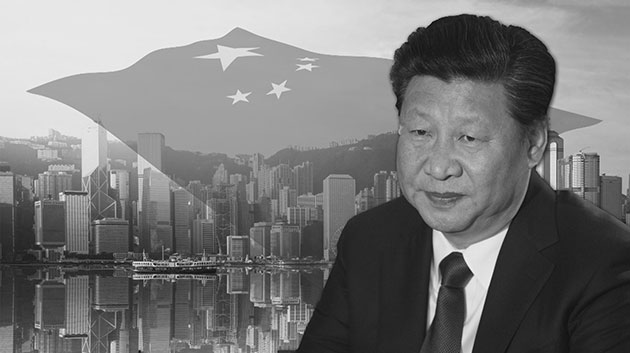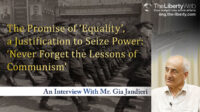Consequences of the Hong Kong Chief Executive Election
Key points in this article:
- Pro-China side solidifies in Hong Kong
- Hong Kong’s ‘housing’ strategy
- Urgent need to spread knowledge of democracy’s brilliance
Carrie Lam, a Beijing-supported candidate, emerged victorious in the Hong Kong Chief Executive Election. As a consequence, China’s influences have increased exponentially. The day after the election, Hong Kong police arrested 9 leaders and key participants of the Umbrella Movement in 2014, including Benny Tai the organizer of Occupy Central, each charged with public obstruction. This was possibly a strategy to restrain anticipated demonstration rallies for Lam’s inauguration on July 1st the 20th anniversary of Hong Kong handover to China.
We interviewed Iris Tong, Hong Kong (freelance) journalist of the U.S.-run media site “Voice of America”, on the political situation in her homeland.
What We Can Expect From the Election Results
—— The Chief Executive Election selection method is through majority vote (at least 601 votes) by the Election Committee made up of 1,200 EC members from various fields; but the majority is from pro-China camp. Obviously the strongest candidate was Carrie Lam, who was receiving support from the Beijing government. How did you feel about the election results?
Iris: Yes, there was nothing surprising about Carrie Lam’s victory. But the people of Hong Kong are laughing at the fact that she got 777 votes, because the number 7 has negative connotations in Cantonese (hints stupid). That aside, looking at the fact that the previous [Beijing supported] Chief Executive Leung Chun-ying won his election with 689 votes, we can see that the pro-China side has solidified even further.
—— We know that the Beijing government intervened in the Chief Executive Election.
Iris: Beijing intervention into this election was even more intense. Some pro-Beijing Election Committee members said they received phone calls from the China Liaison Office in Hong Kong demanding that they had to vote for Carrie Lam. Some EC members were afraid that if they didn’t support Carrie Lam, they would have consequences.
—— Popular candidate and former Financial Secretary, John Tsang Chun-wah had a 90% support rate in polls just one week before the real election.
Iris: Yes. John Tsang emigrated to America with his family when he was teenager, and his campaign strategy attracted more of the younger generation, and even the middle class. He was popular with both the pro-China and pro-democracy citizens. Some political and media analysis after the election proposed that the “John Tsang effect” may become the “Third Way” in the future.
The Beijing government tried to stop him from running for office, but he did anyway. He thought he could get support from the 320 pro-democracy EC members and over 200 pro-Establishment EC members. What he didn’t realize was the strength of Beijing’s influences.
Growing Chinese Population and Hong Kong Housing Insufficiency
—— What are the issues that the new Chief Executive will face?
Iris: The greatest issue is whether she can unify Hong Kong society. This is not an easy feat, especially because Carrie Lam is someone who was chosen by the Beijing government. The policies through which she can gain the trust of the Hong Kong citizens are the ones directly related to their well being, particularly housing.
—— Why is housing a problem?
Iris: The people of Mainland China don’t trust their country, so they are trending towards overseas investment. Hong Kong is one of their important investment sites. This is partly why the people of Mainland China buy houses in Hong Kong.
What this means is that property prices increase, making it harder for the people of Hong Kong to buy houses. Legislating new restrictions will not be able to stop the people of China from buying houses through Hong Kong friends or relatives.
Also, Hong Kong has an immigration system where anyone who lives and works in Hong Kong for 7 years can apply for permanent residency. This was a policy created during British occupation to increase the number of laborers, and it’s still in use today. Further, there are around 150 people from China using this “One-way Permit” per day to settle in Hong Kong. In 20 years, there will be a total of 1 million. This means that 1 in 7 people in Hong Kong would be from Mainland China.
Although the permit is specifically for the purpose of family reunion, not for general immigration, the scheme is controversial. The permit issued by the Chinese government even allows uneducated or poor people to settle in Hong Kong. I think it’s a policy of “population washing”.
Martin Lee, former chairman of Hong Kong Democratic Party, said that the “One-way Permit” policy is part of the CPC’s strategy of long-run “Tibetisation” of Hong Kong, aimed at marginalising Hong Kong people and their core values over time”.
Showing China the Brilliance of Hong Kong’s Democracy
—— There has been a decrease in the number of people who join protest rallies. What is the situation for Hong Kong civilians?
Iris: After the Umbrella Movement, democracy demonstrations got more and more extreme, like throwing bricks and lighting things on fire. In the Fishball Revolution at Mong Kok on the night of 8 February 2016 between localist groups and police, those arrested were sentenced to three years of imprisonment.
These verdicts are restraining student groups from demonstrating or radicalizing. The prosecution announcement for those involved in the Umbrella Revolution had a similar purpose. Civilian demonstrations only led to stricter crackdowns, and they are getting tired of seeing no results. There are many others who despair at the crumbling ‘One Country, Two Systems’ policy and emigrate to Canada, Taiwan or Australia.
I’m not against street rallies, but what is important is to show the people of China how brilliant democracy is, although this may take a long time. The spirit of democracy is to respect people with different ideas.
In contrast, China is a one-party regime: people who hold different ideas are not accepted. Hong Kong has multiple different parties, and we can support various opinions. This is what fundamentally stabilizes society. Spreading the knowledge of democracy’s brilliance is more important than street rallies.
◆ ◆ ◆
Iris Tong decided to become a journalist after the Tiananmen incident. Her passionate struggle to become a beacon of hope in Hong Kong and to democratize China brings to light the importance of shaping international opinion. It is time we consider a support system between the U.S., Taiwan and Japan for the democratization of Hong Kong.



















